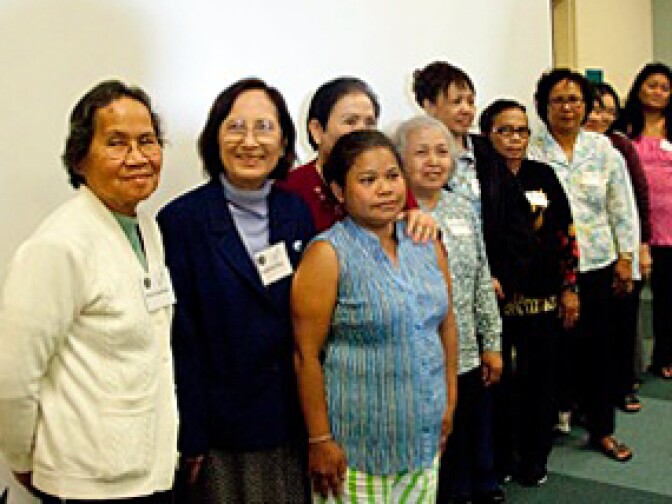Cambodia’s brutal Khmer Rouge government fell more than 30 years ago. The power behind the infamous “Killing Fields” killed as many as 2 million Cambodians through executions, starvation and disease.
Later this year, four Khmer Rouge leaders are set for trial before a United Nations-backed tribunal that’s charged them with genocide and crimes against humanity. Among those on trial is Nuon Chea. He was second-in-command to Khmer Rouge leader Pol Pot, who died more than a decade ago.
The trial will take place in Cambodia. But some in Long Beach, home to the largest Cambodian-American population in this country, are trying to help the prosecution from half a world away.
On a recent Saturday in Long Beach, survivors of the Khmer Rouge stepped to a microphone to tell stories that are hard to hear.
Sophany Bay counsels Cambodian-Americans on mental health matters. In the 1970s, she was a teacher in Cambodia’s capital, Phnom Penh, until the Khmer Rouge sent her to a forced labor camp in the countryside.
While there, her 6-month-old daughter got sick. She the baby to someone she thought was a nurse. He wasn’t.
"He took my baby and put my baby on the table and injected something into her head. When he put my baby on the table, it died immediately," said Bay.
The man who gave the shot was a Khmer Rouge soldier. Sophany Bay’s two other children also died after soldiers beat them.
She and other Cambodians gathered at Long Beach’s Mark Twain Library to learn about the upcoming trial, known as "Case 002."
Lawyers from the San Francisco-based Center for Justice and Accountability helped sponsor the meeting. The legal organization is representing Khmer Rouge survivors at the upcoming trial.
Case one ended last year when the tribunal handed down a 35-year sentence to Kang Guek Eav, or Duch. He ran a notorious torture prison. The court later reduced Duch’s sentence by almost half, in part because of the time he’d already served.
Many victims of the Khmer Rouge criticized that reduced sentence. Lawyer Nushin Sarkarati of the Center for Justice and Accountability said part of her job is to explain to Cambodian-Americans what the courts can and cannot do.
“For example, in case one, many people asked, ‘Why didn’t Duch get the death penalty?’" said Sarkarati. "This court does not permit the death penalty, so that wasn’t even an issue on the table."
In recent years, several parties have tried to involve more Cambodian-Americans in the second trial. Cal State Long Beach sociologist Leakhena Nou has played a major role in that effort. She founded the Applied Social Research Institute of Cambodia.
For almost three years, she’s gathered the testimony of Khmer Rouge survivors and sent it to the tribunal. Nou attended the recent Long Beach meeting to let the survivors know the court has accepted their testimony. She told them that they were the "heroes" behind the movement to seek justice.
The tribunal has also accepted more than 30 Cambodian-Americans as civil parties whose testimony will be admitted as evidence. Sophany Bay, the woman who lost her children, is one of 14 from California.
Andrea Evans is the legal director for the Center for Justice and Accountability. She said it's rare for survivors to take such an active role in this kind of trial.
"It’s the first time that an international court has allowed this type of participation by survivors directly in the proceedings," said Evans, "so I think there’s going to be a lot of examination about how this works, about how effective it is."
The proceedings could involve them even further. Evans says it’s possible that some of the civil parties could testify as witnesses at the trial in Cambodia.
"We are advocating that at least some of the witnesses who testify are from the United States," said Evans.
Evans said her group is also hoping to fly some of the local Cambodians to Phnom Penh to observe the proceedings.
The court has also left open the possibility of reparations if it convicts the four Khmer Rouge leaders. Lawyers say there are too many victims for monetary payments to make sense. But Sophany Bay, who spoke up at the Long Beach meeting, said she'd accept a museum or memorial that recognizes the victims.
"I want some place for the memory, to remember my children, like other people, like other victims," said Bay.









